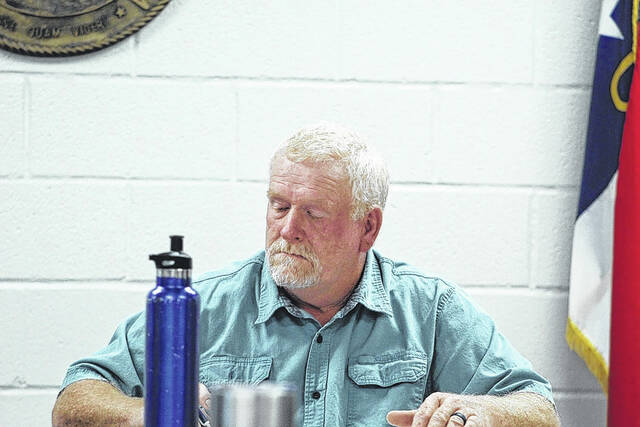After being pushed back and tabled at the Sept. 3 Garland Board of Commissioners’ meeting, members made their final decisions on a golf cart ordinance, how to invest the town’s money and how they will proceed with roof repairs for various buildings in town.
Golf Cart Ordinance
The Garland commissioners decided not to create a golf cart ordinance for the town, and instead follow state and federal guidelines.
The issue of having a golf cart ordinance was first brought up at the Sept. 3 board meeting by Frank Morris, a Garland resident.
During that meeting, he told the board that around 10 years agoa golf cart ordinance was approved but never made it into the town’s ordinance.
“It didn’t have any stipulations to it as long as we stayed off (U.S.) 701 and (N.C.) 411. We could go anywhere we wanted to go. As I said, I don’t know why the minutes never got in the books. That’s what’s causing the problem,” he stressed during that meeting.
Tim Register, who was also present that night, told the board he was personally told the ordinance was approved and added to the town’s Code of Ordinance.
Kimberly Moffett, a consultant with the Mid-Carolina Regional Council who has been helping update the town’s Code of Ordinance, agreed that a less restrictive golf cart ordinance was discussed in 2013, but no ordinance was ever attached so it was never added to the town’s books.
Morris had asked the board to create an ordinance that would allow residents to be able to drive their golf carts even if they weren’t street legal. Instead, they would just need a permit from the town, liability insurance on the cart and to only drive it in the daytime.
A debate took place as to whether or not Garland could make that ordinance considering federal and state law states golf carts must be road-worthy to drive them.
The commissioners decided to table the issue until Sept. 19 so they would have more time to look into the matter.
Last week, they opted not to establish an ordinance.
“We have talked about it,” Mayor Pro-Tem Timothy Blackburn said. “And I feel, maybe like everybody else in the board feels, that we’re going to go by N.C. State law.”
His reasoning, which the board agreed with, was because Garland had no one to enforce an ordinance if one were enacted. Instead, they would let the sheriff’s department come in and decide if golf carts were street legal or not based on what they saw.
In order for golf carts to be street-legal in North Carolina they have to have working headlights, taillights, turn signals, brake lights, reflex reflectors, parking brakes, rearview mirrors, seat belts, a windshield, working horn and DOT-approved tires. The driver must also have liability insurance on the cart, a VIN number and registration.
Only people 16 and over with a valid driver’s license are able to drive golf carts on the street.
Investment Plans
Investment options were also brought up by Commissioners Ralph Smith, Jr. and Jo Strickland during the Sept. 3 meeting and discussed again this week.
The initial idea was to invest $1 million into a money market account with a 4.6 percent interest rate, but there was a downside of it being a variable interest rate. This meant the interest rate would change according to the economy instead of having one set interest rate.
And, while the funds would still be insured by the FDIC, as Strickland reassured the board, some members were still hesitant on making that investment that night without looking into other options.
It was then brought up that a decision would have to be made soon since the board was losing what Smith said was $200 a day since the interest rates were so low.
On Sept. 19, Commissioner Anthony Norris told the board that he had spoken to Southern Bank officials in Garland and listened to the different account types in which they could invest. He brought up putting the money into a six-month CD instead of a money market account because it was a “better bang for their buck.”
Smith said he was a little wary about investing in a CD since the board cannot transfer the money out before the six-month period is over.
Norris reassured the board that they would not be investing the full $1.2 million in excess funds they have. He brought up only investing $800,000 into the account and putting the rest into a money market account.
Smith, after hearing that plan, said they should just put the full $1 million in the CD account and the rest of the excess into a money market account. The main account would still hold the main funds for the town and stay open.
The board unanimously voted to move the funds into the money market and CD account as soon as they possibly could.
Building Repairs
Two roofs in Garland now have repair quotes.
The first one is the roof at the senior center, where water has been getting through due to the chimney.
Commissioner Lee Carberry told the board that the fix for the senior center would be to remove the top layer of brick on the chimney and cap it off with metal. It would then be sealed with a waterproofing sealant.
The total cost for the repair is $750.
The other issue is the roof of the thrift store.
“There are two quotes for the thrift store,” Carberry stated. “One’s a band-aid; one’s a complete fix.”
The band-aid fix would be to clean the roofing area and seal it with plastic before coating it with silicone and covering with waterproof tiles. This would cost the town $4,500.
“That will stop the bleeding for now, but it’s not gonna last for long,” Carberry told the board.
The second option would be to completely redo the roof and replace it with a rubberized roof and seal it.
The total cost for this second option would be between $11,600 and $12,800.
The board agreed to do a full fix for the thrift store roof and to do the needed repairs on the senior center roof.
You can reach Alyssa Bergey at 910-249-4617. Follow us on Twitter at @SamsponInd, like us on Facebook, and check out our Instagram at @thesampsonindependent.












